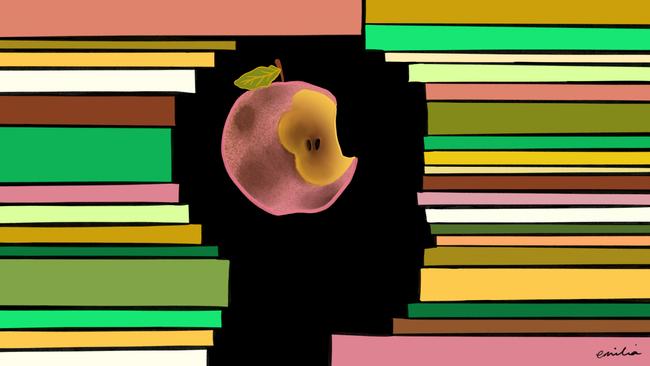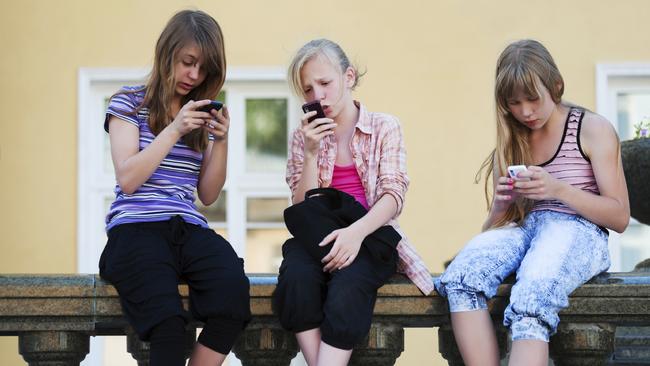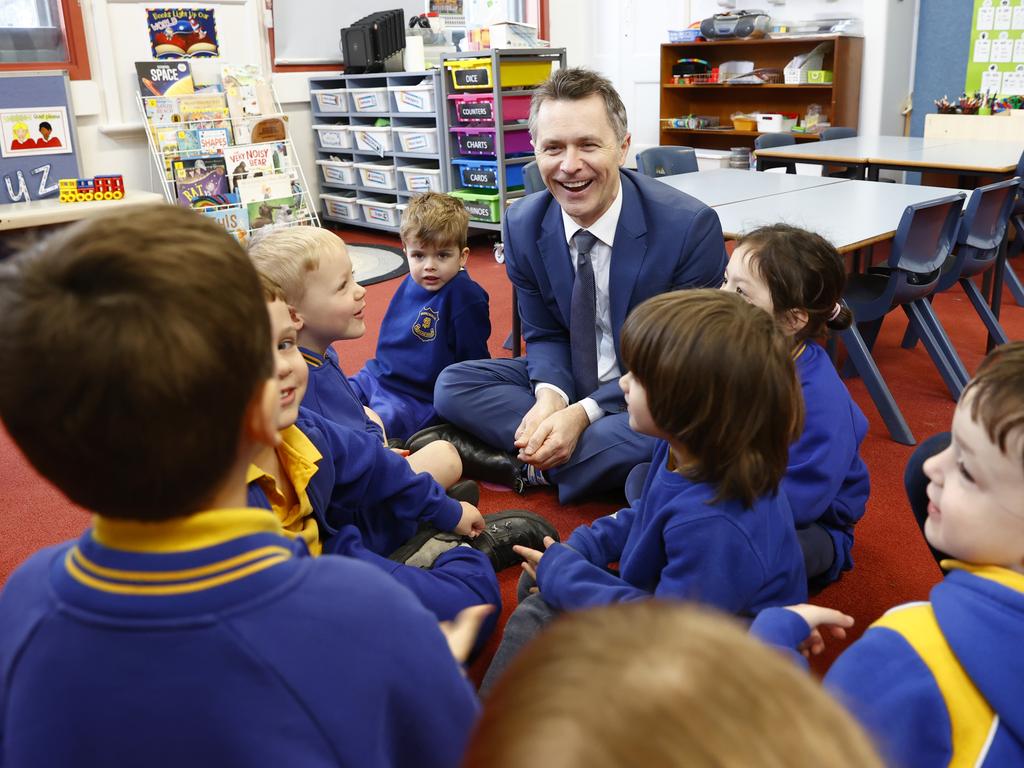PISA testing shows screen time and distraction have dumbed down Australian kids
Real-world accounts back up what alarming new testing data is telling us. One small business owner, who employs six full-time workers in their early 20s, describes them as ‘good staff’ failed by their 13 years of schooling.

A teenage brain drain among “digital natives‘’ glued to online gaming and smartphones must be top-of-mind for Australia’s education ministers as they set new priorities and learning targets for the nation’s schools.
The latest global testing of 15-year-olds’ knowledge in maths, science and reading reveals academic atrophy, from a witches’ brew of disruption, dysfunction and distraction that has dumbed down a generation of children.
Today’s zoomers – the “digital natives” now in their senior years of high school – are nearly two years behind the millennials who took a similar mathematics test in 2000.
In reading, zoomers are 18 months behind the millennials. In science, the 15-year-olds who took the test last year lagged a year behind the teenagers tested in 2006.
“Half of all 15-year-olds really are not performing at the level they should be at,” Australian Council for Educational Research chief executive Geoff Masters says. “It’s things like fractions, decimals, percentages, proportional reasoning, solving mathematical problems where they have to do more than one calculation.
“These are things most kids are expected to master back in primary school. Goodness knows how they’ve coped with the mathematics curriculum in years 8, 9 and 10, because they’re missing a lot of basic learning.”
Failures in the schooling system create problems for the entire Australian community.
One small business owner, who employs six full-time workers in their early 20s, describes them as “good staff” failed by their 13 years of schooling. “Spelling and grammar could only be described as free range,” the business owner wrote to The Australian. “My handwritten phone messages that I receive are akin to text slang and on many occasions I require their assistance in translating the message. Maths skills are appalling and the concept of a ‘percentage’ is non-existent. I spend time trying to explain basic maths concepts and improve their sentence construction.”
A long-term decline in academic outcomes across most of the Western world is revealed in testing by the OECD, which tests the knowledge of 15-year-old students from 81 countries every three years through the Program for International Student Assessment.
Last year’s testing of 13,327 Australian students from 743 schools – postponed for a year because of the Covid-19 pandemic – has mixed news. It is a relief that Australia’s results have stabilised after falling for two decades. And, just as Australian Olympic speed skater Steven Bradbury won a gold medal at Salt Lake City in 2002 when his competitors fell like dominoes, Australia even climbed up the league table.
‘If you’re a teacher in Japan, China or Singapore, you are also a coach, you’re a mentor, you’re a social worker … and you are responsible for their success.’
Australia now sits 16th in maths, 12th in reading and 10th in science. (The ACER, which analysed the OECD data, lumped some of the higher performing countries together, to give a more generous ranking of 10th in maths and ninth in reading and science.)
“We moved up the rank order of countries simply because we stood still and a number of other countries went backwards,” Masters says. “I’m sure the countries that went backwards will jump to the conclusion that it was the pandemic, and maybe that was a big factor.”
ACER found that 15-year-olds from the poorest 25 per cent of families are performing, on average, at the level expected of a 10-year-old in maths, science and reading. In mathematics, the strugglers have grown weaker while the top performers – many of them Asian migrants – are doing better than ever. First Nations students achieved at a level four years behind their non-Indigenous classmates, on average.
Immigrant students are outperforming Australian-born students by a year in maths, and nine months in reading.
Masters is convinced that Australia must change what is taught, and how it’s taught, in schools. “Let’s look at the curriculum, let’s look at how we organise learning in schools,” he says, describing Australia’s schooling system as “an assembly-line model”. “It’s very time-based,” he says. “Students are being forced to move on, on the basis of time, rather than whether they’ve mastered material or not. That is leading so many kids to fall behind in their learning.”
Boredom, disruptive classrooms and the distraction of smartphones and laptops for gaming and social media emerged as big problems in the OECD’s survey of students who sat last year’s PISA test. Nearly half reported feeling nervous or anxious if their phones were not near them, and 60 per cent of Australian teenagers confessed to “frequent problems motivating themselves to do schoolwork”.

Andreas Schleicher, a German mathematician who heads the OECD’s education and skills directorate, says Australian schools and families must do more to keep students motivated. “You need to have that self-motivation for learning, so that’s certainly something where Australia could do better,” he says.
Smartphones – which will be banned in schools nationally when Queensland adopts the ban next year – are educational kryptonite. Four out of 10 Australian students said they were distracted by digital devices in the classroom, compared with just one in 20 students in Japan.
“Students who used (devices) more than an hour a day for leisure – social media apps, browsing the internet or games – saw a big drop in maths scores,” the OECD states in its 1000 pages of analysis. “On average across OECD countries, students who spent up to one hour a day at school on digital devices for leisure scored 49 points higher in maths than students whose eyes were glued to their screens for between five and seven hours per day, after taking into account students’ and schools’ socio-economic profile.”
This means that kids who spent more than five hours a day playing on phones and computers, or streaming videos, lost two years of learning in mathematics.
Schleicher is adamant that “addictive” digital devices are impeding children’s learning across the world. “When technology is used for leisure,” he says, “you can see steeply declining learning outcomes.”
Boredom is another problem in Australian schools, based on the PISA survey of students. When asked why they skipped school, students cited sickness, bullying and boredom.
Masters warns that boredom is an invitation for classroom disruption – the subject of a recent Senate inquiry that heard teachers are being bashed, sexually assaulted and bullied out of the profession by out-of-control students.
“If you’re teaching kids when they’re not ready to learn – or maybe what they already know – you’re going to have students bored or misbehaving,” he says. “Some of the things we think of as problems are actually symptoms of the problem.”
Teaching that is better tailored to the needs of each child is credited for the raging academic success of Asian schools. Singapore “streams” students into groups based on ability.
“They recognise that kids are at different points in their learning and meet them where they are – rather than doing what we do, which is to expect every kid to be at the same point in their learning at the same time,” Masters says.
“We know that the most advanced 10 per cent of students are five or six years ahead of the least advanced 10 per cent in areas like reading and mathematics, and that’s true pretty much at every grade level.”
The OECD’s Schleicher spells out the cultural differences that have helped high-performing countries such as Singapore, Japan, South Korea and Hong Kong top the world in school academic outcomes. “You can see high and consistent expectations on every student,” he says. “One of the factors that may have contributed to Australia’s long-term slide is the loss of demand on students – it’s become easier for students to be successful. That’s not what you see in East Asia – wherever you come from, whatever your background is, the system expects you to do well and redoubles its effort when you’re not.”
Teachers are so involved in children’s lives in Japan, Schleicher says, that if a teenager is nabbed doing something wrong, police will call the teacher before the parents. “In Australia, teachers teach the class and don’t have much responsibility beyond that,” Schleicher says.
“If you’re a teacher in Japan, China or Singapore, you are also a coach, you’re a mentor, you’re a social worker … and you are responsible for their success.”
Schleicher describes Australia’s curriculum as “a mile wide and an inch deep”. “Students learn a lot of stuff at quite superficial depths,” he says. “When you look at East Asia, those countries have high demands on students – very rigorous – but they also teach few topics at greater depths.”
Singapore sends its top teachers to work with students in the greatest need, while in Japan the most effective teachers are transferred to weaker schools. In Shanghai, high-performing teachers are given incentives to teach in disadvantaged schools.
In Asia, parents are more involved in their children’s schooling. “One of the mistakes that we have made in the Western world is to assume that schools can compensate for parental background,” says Schleicher. “That clearly has not been successful. High-performing systems do not treat parents as clients, they actually treat them as co-constructors of learning opportunity. They’re very active in making sure parents play their part.”
Australia’s teachers are flailing in a rip-tide of societal problems: poverty and homelessness, mental illness, addiction and family breakdown. Education ministers plan to put student wellbeing at the heart of the next National School Reform Agreement, with more psychologists, counsellors and better links between education and health systems.
Queensland Education Minister Grace Grace jumped the gun this week, announcing $280m in programs to help vulnerable and disengaged teenagers get through school. This includes a statewide expansion of the alternative “Pathways College”, which Inquirer highlighted as a blueprint for getting troubled teens back to school.
In Western Australia, where students topped the nation in PISA maths and science results, Education Minister Tony Buti has just spent $20m building science laboratories in primary schools. In NSW, Education Minister Prue Car has banned mobile phones in schools, and is rescuing the most experienced teachers and deputy principals from piles of paperwork, to get them back in front of students in classrooms when school resumes next year.
Ministers ought to adopt the teachers’ “show and tell” routine, to share their successes so all Australian students can get back on track.






To join the conversation, please log in. Don't have an account? Register
Join the conversation, you are commenting as Logout